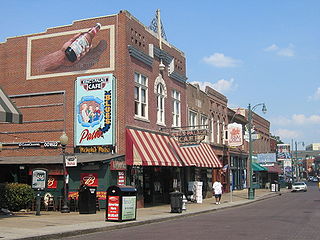 W
WBeale Street is a street in Downtown Memphis, Tennessee, which runs from the Mississippi River to East Street, a distance of approximately 1.8 miles (2.9 km). It is a significant location in the city's history, as well as in the history of blues music. Today, the blues clubs and restaurants that line Beale Street are major tourist attractions in Memphis. Festivals and outdoor concerts frequently bring large crowds to the street and its surrounding areas.
 W
WBlues dancing is a family of historical dances that developed alongside and were danced to blues music, or the contemporary dances that are danced in that aesthetic. Amateur Dancer carried an article entitled "Blues and Rhythm and Blues Dancing" in a July/August 1991 issue.
 W
WA fife is a small, high-pitched, transverse aerophone, that is similar to the piccolo. The fife originated in medieval Europe and is often used in Fife and Drum Corps, military units, and marching bands. Someone who plays the fife is called a fifer. The word fife comes from the German Pfeife, meaning pipe, which comes from the Latin word pipare, possibly via French fifre.
 W
WJazz royalty is a term encompassing the many jazz musicians who have been termed as exceptionally musically gifted and informally granted honorific, "aristocratic" or "royal" titles as nicknames. The practice of affixing honorific titles to the names of jazz musicians goes back to New Orleans at the start of the 20th century, before the genre was commonly known as "jazz".
 W
WJuke joint is the vernacular term for an informal establishment featuring music, dancing, gambling, and drinking, primarily operated by African Americans in the southeastern United States. A juke joint may also be called a "barrelhouse".
 W
WMy Brother's Blues is the fourth album from bluesman Benny Turner. My Brother's Blues, released in 2017, is a tribute to Turner's brother and bandmate, Freddie King. The album contains 11 titles from King's songbook, all chosen because they have special meaning to Turner.
 W
WRace records were 78-rpm phonograph records marketed to African Americans between the 1920s and 1940s. They primarily contained race music, comprising various African-American musical genres, including blues, jazz, and gospel music, and also comedy. These records were, at the time, the majority of commercial recordings of African-American artists in the US. Few African-American artists were marketed to white audiences. Race records were marketed by Okeh Records, Emerson Records, Vocalion Records, Victor Talking Machine Company, Paramount Records, and several other companies.
 W
WThe Richter-tuned harmonica, or 10-hole harmonica or blues harp, is the most widely known type of harmonica. It is a variety of diatonic harmonica, with ten holes which offer the player 19 notes in a three-octave range.
 W
WSlide guitar is a technique for playing the guitar that is often used in blues music. It involves playing a guitar while holding a hard object against the strings, creating the opportunity for glissando effects and deep vibratos that reflect characteristics of the human singing voice. It typically involves playing the guitar in the traditional position with the use of a slide fitted on one of the guitarist's fingers. The slide may be a metal or glass tube, such as the neck of a bottle. The term bottleneck was historically used to describe this type of playing. The strings are typically plucked while the slide is moved over the strings to change the pitch. The guitar may also be placed on the player's lap and played with a hand-held bar.